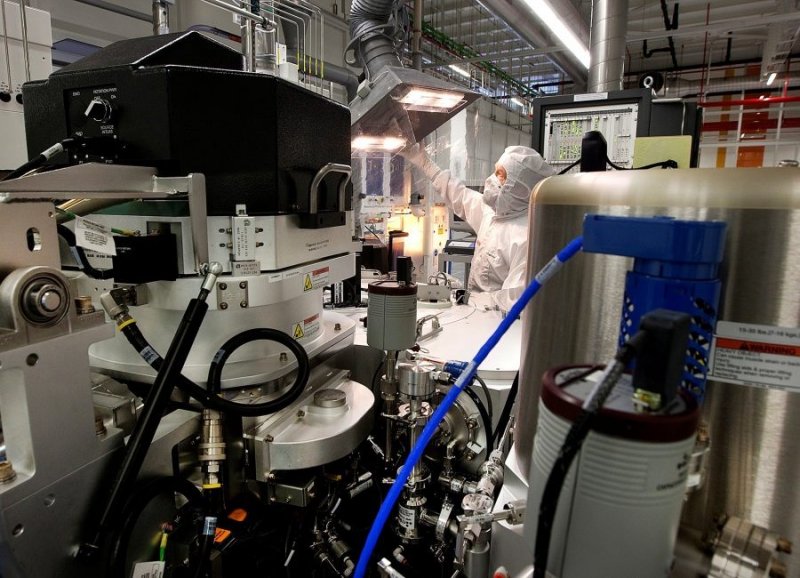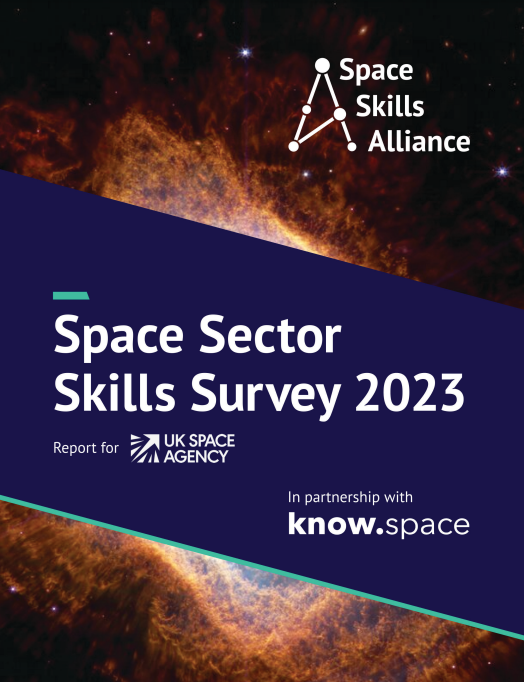
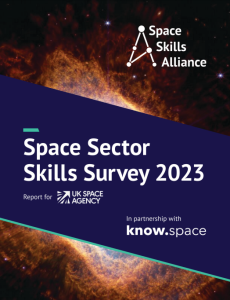
The agency – which commissioned it together with the Department for Science, Innovation and Technology – intends the report to underpin the UK Government’s understanding of the skills gaps and workforce challenges within the space sector. The last such survey was carried out in 2020.
Headline findings include uncompetitive pay and conditions being a challenge for staff retention (particularly for large companies), the biggest skills gaps being for ‘AI & machine learning’ (41%) and ‘data analysis & modelling’ (36%), over a third of companies trying to hire from outside of the UK, and competition with other sectors increasing significantly (with engineering (39%) and tech/IT (20%)). The skills gaps meant delays in product development (65%), but this was largely unchanged from the 2020 survey. Half (50%) of organisations, however, expect that their space skills needs will be different in three years’ time…
Recruitment
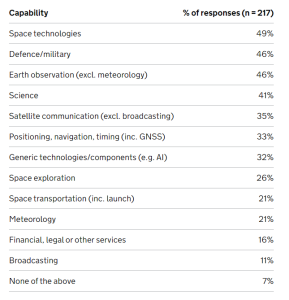 Breaking the responses down, into sections, recruitment difficulties were highlighted. Eighty per cent of those respondents who recruited has faced recruitment difficulties (up from the 61% of the 2020 survey. About two thirds (72%) of roles were difficult or very difficult to recruit for, and only 10% were easy or very easy. The average role took a median of 10 weeks to hire for.
Breaking the responses down, into sections, recruitment difficulties were highlighted. Eighty per cent of those respondents who recruited has faced recruitment difficulties (up from the 61% of the 2020 survey. About two thirds (72%) of roles were difficult or very difficult to recruit for, and only 10% were easy or very easy. The average role took a median of 10 weeks to hire for.
The two most commonly cited reasons for recruitment difficulties were that applicants lacked the required specialist skills, knowledge, or qualifications (76%), or that there simply were not enough applicants in the first place (67%).
The main cause cited for difficulty recruiting is competition with other sectors (68%) and with other space companies (45%). While the competition from other space companies has remained largely constant since the 2020 survey, competition with other sectors has increased significantly, particularly engineering (39%) and tech/IT (20%). Uncompetitive pay was the second biggest issue in recruitment, cited by 39% of respondents.
Retirement was cited by 21% of respondents with retention challenges.
Skills gaps
An unchanged number of organisations, 51%, reported skills gaps in their current workforce. But note that this is significantly lower than the wider economy (73%). Apparently, the problem is acute for large organisations, where 65% report a skills gap in their current workforce.
The skills gaps are a result of struggling to hire new staff (48%), new staff not having the right skills (45%), and existing staff leaving (34%). This has barely changed since 2020.
As mentioned, 36% of companies tried to hire from outside of the UK, most usually large (58%) and medium organisations (56%), rather than small (38%) or micro (16%) ones. Of these, 83% faced difficulties including high costs and the complexity of the visa process, and 21% were not successful.
Intervention
“[The] findings and recommendations, garnered from hundreds of space sector organisations from across the UK and of all scales, are sobering and constitute a sector-wide clarion call for greater focus and co-ordinated intervention,” said Professor Anu Ohja, Director of Championing Space at the UK Space Agency.
“The fundamental issues the sector is facing around skills haven’t changed, but the scale and significance of the problems have increased, with significant numbers of sector companies reporting skills gaps in their workforce, difficulties with recruitment, and retention issues inhibiting company growth, productivity, and quality.”
You can read the full report here.
“These results will be the primary source of evidence to support the government’s space skills policy-making, and to determine how the UK Space Agency allocates more than £4 million of investment in training initiatives specifically targeting the early and mid-career stages,” said Doug Liddle, the Chair of the Space Skills Advisory Panel and also the CEO of In-Space Missions.
“The evidence shows that once we bring people in and imbue them with a sense of pride and excitement in what our sector does, they want to stay and build a career here,” he added. “This is encouraging and reflects many of our personal experiences, but we cannot solely rely on the inspiration inherent in our sector to attract and retain.”
Collection
The survey was conducted via an online form that was open from 24 April to 2 June 2023. Also, 21 in-depth structured interviews were conducted to gather qualitative data, says the UKSA.
Responses were received from 218 organisations – including companies, government bodies, universities, and third sector organisations, with the responses representing about 12% of space companies employing about 12,000 people (35% of the space workforce).
Responses were overwhelmingly from industry (86%). Academic bodies (9%), government (3%), and third sector (2%) organisations also responded. Two thirds (66%) of respondents were from micro or small organisations.
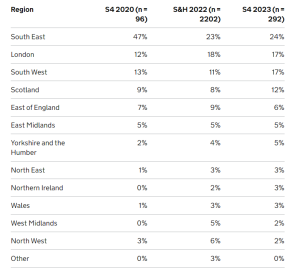 Apparently, the regional distribution (see right) of the respondents aligned closely with the distribution of space companies recorded in the previous Size & Health of the UK Space Industry report 2022. (The South West and Scotland are slightly overrepresented, while the West Midlands and North West are slightly underrepresented.)
Apparently, the regional distribution (see right) of the respondents aligned closely with the distribution of space companies recorded in the previous Size & Health of the UK Space Industry report 2022. (The South West and Scotland are slightly overrepresented, while the West Midlands and North West are slightly underrepresented.)
What, exactly, constitutes the ‘space sector’? The wording used in promoting the survey was: “All organisations employing space professionals or using space as part of their day-to-day operations. This includes companies that build and launch satellites, use Earth observation data, and build software for the space sector.”
See also: XCAM awarded funding from UK Space Agency to study space weather


